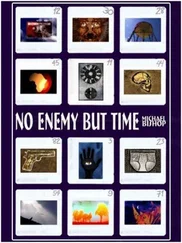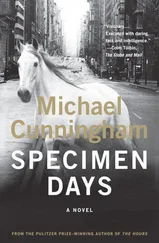Maybe I had a hunch that McElroy would mention a recent $5,000 contribution from Adam Montaraz. Bingo. He acknowledged it just as an army of cleancut ushers began filing toward the altar to pick up the collection plates. Adam, too busy trying to think of a nine-letter word for “false piety” to glance at the set, made no sign he’d heard McElroy acknowledge the donation.
That afternoon, however, he fell asleep while watching a Braves game on Channel 17. I turned off the set without rousing him, a notable achievement because he usually slept as lightly as a cat. McElroy’s sermon had been called “Energizing Commitments,” and that was what Adam seemed to need. Unfortunately, he had not listened to the man.
On Monday about 10 A.M., I drove into town and stopped first at the Greyhound Depot Laundry to pick up my tablecloths. Ben Sadler, already looking rumpled and dehydrated, had them waiting on the counter. The black woman who operated his steam press—a forbidding-looking instrument with a lid like a coffin’s—also made a point of marking my entrance. Uh oh, I thought. What’s going on?
My subsequent talk with Ben was curiously aimless, focusing on such weighty topics as the humidity level and hog-market prices. Strange. Ben usually liked to provoke a verbal scrap over the deployment of U.S. forces in Central America or the morality of alcoholic-beverage licenses for local eating establishments. I started to leave.
“Say,” said Ben, “do you take Newsweek ?”
“I don’t subscribe. Occasionally, I’ll buy a copy. Why?”
“Have you seen this week’s issue?”
“Is it out already?”
“Hy Langton, over at the drugstore, gets his copies first thing Monday mornin’. I bought one right off. He don’t know what to do with the rest of ’em, though—put ’em out for sale or stash ’em down under the register.”
“ Newsweek ? With the Playboys and Penthouses ?”
“It’s a eye-opener, the new one. Milly and me—” nodding at the steam-press operator, who looked down in acute embarrassment— “we’ve been discussin’ how much times’ve changed, to let a magazine like ol’ Newsweek use the kinda cover it’s just used. Is it still safe to send your kids down a small-town sidewalk ’thout a blindfold?”
“But you bought a copy?”
“I got it for you, Paul.” Even in the morning heat and the heat of the laundry, Ben managed to blush. “Don’t be insulted. It’s not that I think you’re a creep or somethin’. It’s just that, you know, once bein’ married to an artist and all, you’re more sophisticated than most folks in Beulah Fork. You know how to take such stuff ’thout bein’ prurient about it. Isn’t that the word, prurient ?”
“For God’s sake, Ben, what are you talking about?”
“Here.” With one emphatic motion, he produced the magazine from beneath his counter and plonked it down on the folded tablecloths. The magazine’s cover slapped me hard, but I kept my face as noncommittal as I could. Let Ben and Milly invent a reaction rather than simply relate it. The gossip mills would grind no matter what I did.
And the cover on the new Newsweek ?
Well, it consisted of a photograph of Adam and RuthClaire standing side by side, frontally nude, Adam to the left, RuthClaire to the right. Adam had his hand raised in a venerable human gesture signifying “Peace” or “I have no weapon.” My ex-wife, although visible frontally from head to toe, was standing with her left leg slightly extended and her body canted a little bit toward Adam’s. Eye-catching as they were, the couple occupied only the vertical right half of the cover.
The other half contained a pair of clocks side by side beneath the second three letters of the Newsweek logo. One clock had the initials B.C. in its center, the other the abbreviation A.D. In shadow under the clocks hung a clear Plexiglas model of the African continent, while at the bottom of the photo, going from left to right beneath the suspended continent and the primeval couple, floated a string of islands representing the Greater and Lesser Antilles. From the island Hispaniola shot out a sequence of arrows demarcating the wake of a fishing boat on its way past Cuba to the tip of Florida. A legend superimposed beneath the feet of Adam and RuthClaire proclaimed:
THE NEW PHOTOGRAPHY
An Art in Militant Transition
“Bet this gets a lot of bluenoses to cancel subscriptions,” Ben said.
I didn’t reply, but Ben was probably right. Whoever had taken this photograph had not bothered to air-brush the pubic hair or private parts of my ex and her husband. That was why I thought I knew the photographer’s identity. I flipped to the cover story at the magazine’s heart. Scanning its lead and several paragraphs, I found the name Maria-Katherine Kander repeatedly. In fact, two of the photos accompanying the article were fairly tame portraits—i.e., the models either in shadow or semimodestly draped—from the Abraxas show that had featured Adam’s paintings and the colorful work of various Haitian artists. I had stepped into a timewarp flinging me back to February.
“Did you know they’d done this, Paul? Had their pictures taken nude?”
“No. No, I didn’t.”
It was hard to imagine RuthClaire consenting to such a portrait. She was as naked in this Newsweek cover as I’d ever seen her. Midway through our marriage, she had made up her mind that regular intercourse with me had about it the irresistible romance of changing a flat on a ’54 Chevy jalopy. It was not that she was puritanical or cold, but that for her sex had become a time-consuming process best left to people with nothing more important to do. Her sense that I would probably never father her child had reinforced this cavalier attitude in her. If procreation was out, and pleasure had fled, why bother? At any rate, the last time I’d seen her unclad was the night I’d climbed into a magnolia tree on Paradise Farm to take pictures of Adam in the downstairs bathroom. She had been infinitely more provocative in that setting. In the Kander photo, she seemed to represent Womankind for an alien eye that might not otherwise grasp the concept.
In a way, of course, that was exactly the point.
I set the magazine atop the tablecloths and gathered it and them up in my arms. “Thanks for the Newsweek , Ben.” I staggered across the street with this load, dumped the tablecloths into a chair, and told Livia George that, once again, she’d have to handle the luncheon crowd without me. She waved a hand in dismissal. Nothing I did or failed to do surprised her anymore. So, rolled-up Newsweek in hand, I exited the West Bank and climbed into my car.
Neil Hammond’s jacked-up purple pickup sat in front of my house at Paradise Farm. Hammond was in the living room with a stack of Newsweek s balanced on one of my more fragile-looking end tables holding the magazines in place with the heel of his hand. Adam perched on a wingback across from him, looking penitent and befuddled. My own copy was clutched in my fist like a billy club.
“You’ve seen it,” Hammond said. “You’ve seen the day’s major disaster.” He gestured at the magazines. “I saw it about an hour ago, when I went to the drugstore to buy my wife an anniversary card. I bought every Newsweek in the damn place. Mr. Langton thinks I’m a world-class pervert. It’s probably blown my cover.” He shook his head. “My cover blown by a magazine cover. Funny, huh? I went to every corner of town buying the damn things up, but the damage has already been done. People here remember Mrs. Montaraz—they remember her well—and a lot of magazines that went out on the racks were grabbed for souvenirs. Tomorrow, the folks who have subscription copies’ll get theirs. There’s no way to put a lid on this. It’s a public-relations disaster, a blow to all we’ve been trying to do in this case.” He lifted his hand from the magazines, which slid to the floor in a cascade of whispery thumps.
Читать дальше












